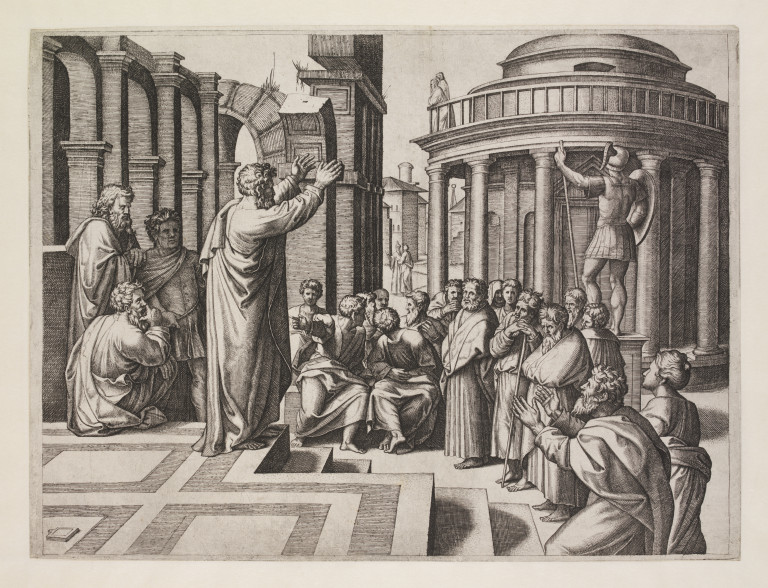Paul spoke to the Athenians. Four things he shared about God:
1. God is the Great Creator v. 24
Paul goes back to Genesis 1-2 where God creates everything, including all human beings. He is a transcendent God, beyond all of creation. He is so great that nothing can contain Him. The Lord Yahweh cannot be manipulated or contained by temples or humans or else He wouldn’t be God. See 1 Kings 8:27, Isaiah 66:1-2, Acts 7:48-50
The Athenians had it all wrong. God wasn’t in their temples.
What Paul said was against what the Athenians believed, specifically the Epicureans and Stoics.
There is a God who is the creator of everything and he is close.
2. God is the Good Provider and Sustainer of life v. 25
God is self-sustaining and doesn’t need anyone or anything. God doesn’t need to be served. He doesn’t anyone to make him complete.
He doesn’t need sacrifices or anything else.
God Gives Life and Sustains Everything
As the Creator he can give and take life but he also sustains it. Colossians 1:17 Greeks believed Zeus gave life, Paul said God gives “zoe”, life. He provides for us. We are not self-sustained.
3. God is the Sovereign Ruler v. 26-29
A. He Created the Nations v. 26-27a
Out of Adam came all nations. When God confounded the languages in Genesis 11, He determined how long each would last and what their boundaries would be. He is sovereign over the nations. v. 26 see Daniel 4:35, Deuteronomy 32:8
The Greeks believed they originated from their own land, Attica. Paul said God created everyone out of one man.
He Created the Nations so They Would Seek Him v. 27a
God has created all these nations so they would seek Him but most of them do not. They are rebellious and live in their own desires.
God’s desire is to unite all nations in Christ.
B. He is Close (immanent) v. 27b-28
The sovereign God is not far. He has chosen to reveal Himself and to be close to us.
Paul points out that even their own poets (i.e. Epimenides, Aratus and Cleanthes) were able to see the truth that there is a God that exists, created and sustains everything and wants to be known.
C. He is Not a Created Being v. 29
God is the only non-cause cause. He is the only one who has no beginning and no end. He is the first and last, the Alpha and Omega.
God is not human. He is a spirit being (John 4:24) thus it cannot be represented visibly.
4. God is the Merciful Savior v. 30-31
A. He has Chosen Not to Punish Now v. 30a
God is merciful and has chosen not to execute judgment in spite of our ignorance and idolatry. The Athenians were no exceptions.
B. He Commands All People Everywhere to Repent Now v. 30b
What is he commanding us to repent of? Of our ignorance in living as rulers instead of submitting to him. He wants us to repent of our sin of rebellion in having our own gods. He desires people to turn to the true and living God.
C. He Has Appointed a Judgment Day v. 31
God has set a day when he will judge everyone based on Christ’s death and resurrection. God has shown his love, mercy and grace but giving his son to die on our behalf. We can avoid the judgment of God by believing in Christ as our savior who took our punishment on the cross. This requires that we repent of our sins and turn to Christ. If we choose not to, we will condemned by God.
How did they respond?
Some of the hearers ridiculed Paul.
People nowadays do the same. They ridicule the Gospel.
Some of the hearers wanted to know more. Many people are like that, but they just to expand their knowledge.
Dyonysius and Damaris, two hearers believe the Gospel along with others. God granted them repentance.
Athens was a philosophical city but it needed the Gospel. Even though not many believed, the Lord used Paul to bring some to faith.
In our times, we also have our Athens. We are called to share the Gospel. God will use us in spite of the hardness of hearts. He will use the foolishness of the cross to save.
to re-post or reproduce without editing the content.
Disclaimer:
The contents of all personal web pages and blogs published are solely my responsibility.
Statements made and opinions expressed on personal pages are strictly those of the author and not of any organization, church, or school.














